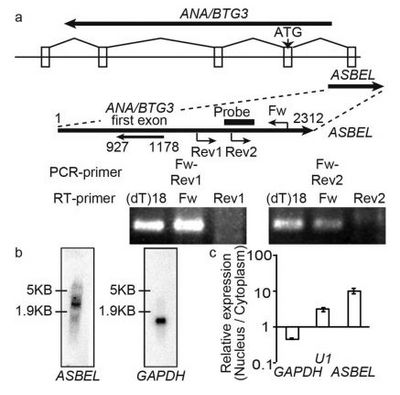Difference between revisions of "BTG3-AS1"
Jiabao Cao (talk | contribs) |
|||
| Line 7: | Line 7: | ||
===Characteristics=== | ===Characteristics=== | ||
[[File:ASBEL-1.JPG|right|thumb|400px|'''ASBEL is transcribed from the DNA strand opposite to ANA/BTG3'''<ref name="ref1" />.]] | [[File:ASBEL-1.JPG|right|thumb|400px|'''ASBEL is transcribed from the DNA strand opposite to ANA/BTG3'''<ref name="ref1" />.]] | ||
| − | ASBEL | + | ASBEL is transcribed from chromosome 21 (21q21.1), and encodes a conserved, 2-kb ncRNA (termed ASBEL [antisense ncRNA in the ANA/BTG3 (three) locus]). the 5' region of ASBEL is complementary to a portion of the 5' untranslated region (UTR) and the first exon of ANA/BTG3 mRNA <ref name="ref1" />. |
| − | === | + | ===Function=== |
| − | + | In ovarian carcinoma, ASBEL promotes tumorigenesis through suppressing translation of the sense gene (ANA/BTG3) <ref name="ref1" />. ASBEL forms duplexes with ANA/BTG3 mRNA in the nucleus and suppresses its cytoplasmic transportation, leading to negative regulation of ANA/BTG3 at protein level without changing of its mRNA level <ref name="ref1" /><ref name="ref2" />. | |
| − | + | ASBEL also plays a key role in Wnt/β-catenin-mediated tumorigenesis <ref name="ref2" />. ASBEL interacts with and recruits transcription factor 3 (TCF3) to the activating transcription factor 3 (ATF3) locus and represses the expression of ATF3, resulting in proliferation and tumorigenicity of colon tumor cells <ref name="ref2" />. | |
| − | |||
| − | |||
| − | |||
| − | |||
===Regulation=== | ===Regulation=== | ||
| − | β-catenin directly | + | β-catenin is found to directly enhance the transcription of ASBEL <ref name="ref2" />. |
| − | ATF3 functions as a component in the negative feedback loop that inhibits ASBEL expression | + | ASBEL represses transcripting of ATF3, and ATF3 functions as a component in the negative feedback loop that inhibits ASBEL expression <ref name="ref2" />. |
===Disease=== | ===Disease=== | ||
| − | Ovarian carcinoma<ref name="ref1" /> | + | Ovarian carcinoma <ref name="ref1" /> |
| − | colorectal cancer<ref name="ref2" /> | + | colorectal cancer <ref name="ref2" /> |
===Expression=== | ===Expression=== | ||
| − | ASBEL expression is higher in stage I–III colon cancer than in normal tissues | + | ASBEL expression is higher in stage I–III colon cancer than in normal tissues <ref name="ref2" />. |
==Labs working on this lncRNA== | ==Labs working on this lncRNA== | ||
Revision as of 08:03, 31 July 2017
Contents
Annotated Information
Name
BTG3-AS1:BTG3 antisense RNA 1
ASBEL[1]
Characteristics

ASBEL is transcribed from chromosome 21 (21q21.1), and encodes a conserved, 2-kb ncRNA (termed ASBEL [antisense ncRNA in the ANA/BTG3 (three) locus]). the 5' region of ASBEL is complementary to a portion of the 5' untranslated region (UTR) and the first exon of ANA/BTG3 mRNA [1].
Function
In ovarian carcinoma, ASBEL promotes tumorigenesis through suppressing translation of the sense gene (ANA/BTG3) [1]. ASBEL forms duplexes with ANA/BTG3 mRNA in the nucleus and suppresses its cytoplasmic transportation, leading to negative regulation of ANA/BTG3 at protein level without changing of its mRNA level [1][2].
ASBEL also plays a key role in Wnt/β-catenin-mediated tumorigenesis [2]. ASBEL interacts with and recruits transcription factor 3 (TCF3) to the activating transcription factor 3 (ATF3) locus and represses the expression of ATF3, resulting in proliferation and tumorigenicity of colon tumor cells [2].
Regulation
β-catenin is found to directly enhance the transcription of ASBEL [2]. ASBEL represses transcripting of ATF3, and ATF3 functions as a component in the negative feedback loop that inhibits ASBEL expression [2].
Disease
Ovarian carcinoma [1]
colorectal cancer [2]
Expression
ASBEL expression is higher in stage I–III colon cancer than in normal tissues [2].
Labs working on this lncRNA
- Laboratory of Molecular and Genetic Information, Institute of Molecular and Cellular Biosciences, The University of Tokyo, 1-1-1 Yayoi, Bunkyo-ku, Tokyo 113-0032, Japan.[1]
- Laboratory of Molecular and Genetic Information, Institute of Molecular and Cellular Biosciences, The University of Tokyo, Bunkyo-ku, Tokyo 113-0032, Japan.[2]
References
- ↑ 1.0 1.1 1.2 1.3 1.4 1.5 1.6 Yanagida S, Taniue K, Sugimasa H, Nasu E, Takeda Y, Kobayashi M, Yamamoto T, Okamoto A, Akiyama T. ASBEL, an ANA/BTG3 antisense transcript required for tumorigenicity of ovarian carcinoma. Sci Rep. 2013;3:1305.
- ↑ 2.0 2.1 2.2 2.3 2.4 2.5 2.6 2.7 Cite error: Invalid
<ref>tag; no text was provided for refs namedref2